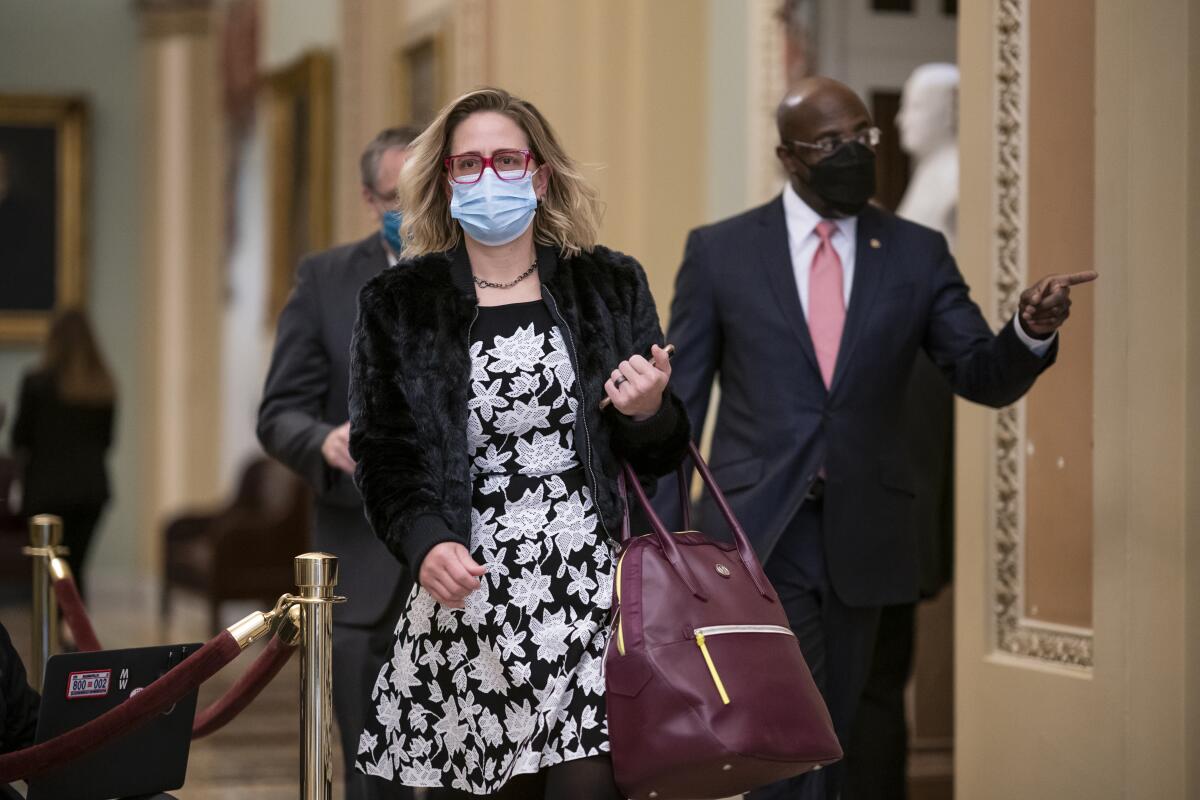Hey, Kyrsten Sinema and Joe Manchin, it’s happening here, and you can stop it

- Share via
Good morning. I’m Paul Thornton, and it is Saturday, June 5, 2021. Let’s take a look back at the week in Opinion.
Here’s something sad: We’re starting to get an answer to the question of what it must have felt like when past democratic societies weakened to the point that authoritarians could gain power and elections no longer mattered. Across the country, legislatures controlled by openly anti-democratic Republicans are passing bills that will not only make voting more difficult but will enable them to overturn election results on the flimsiest of excuses.
The U.S. Senate could put a stop to much of this by passing two bills that would restore full voting rights and prevent corruption in federal elections. But it isn’t, on the grounds that doing so by ridding itself of the filibuster would anger Senate Republicans.
This is not to diminish his malevolence, but the biggest obstacle here isn’t Minority Leader Mitch McConnell. It’s two Democrats, Sens. Joe Manchin III of West Virginia and Kyrsten Sinema of Arizona. As op-ed columnist Virginia Heffernan points out, Manchin’s position as a red-state Democrat is precarious, but Sinema has no such worry: Arizona voted for Joe Biden and elected another Democrat to the Senate in 2020, and she is actually a co-sponsor of one the bills facing obstruction by the filibuster.
In other words, Sinema has put herself in a position to extend the life of American democracy, and she is simply declining to do so.
This brings up another question we often hear when talking about the decline of past democracies: Where were the warnings? Of course, it’s hard to judge the historical impact of an event, a law or a movement while it’s happening; that requires foresight. But right now, we are being warned — by Black citizens in America who know what voter suppression looks like, by our own historians and other experts sounding the alarm and, indirectly, by Republican legislators who cynically feed an ex-president’s conspiratorial delusions.
Perhaps, then, the question so often asked about democratic societies that succumbed to authoritarianism requires a correction as much as an answer: There were warnings, but the people who could have done something in response to them simply didn’t. Right now, in the United States, those people are Manchin and Sinema.
Beach apartments for homeless people? Venice residents are leery. Op-ed columnist Robin Abcarian, who lives in Venice, notes that she and her neighbors have seen crime spike, tent encampments proliferate and fires consume buildings as their neighborhood has become another center of homelessness in Los Angeles. Understandably, Abcarian’s neighbors are frustrated with local leadership and reluctant to welcome a new development that would house currently homeless and low-income people. “But,” Abcarian says, “no one is more vulnerable to catastrophic outcomes than the folks who through addiction, mental illness, sheer bad luck or choice sleep outside.” L.A. Times
Preserve the Taix building? That’s too much. File this one under “confusing nostalgia for historical significance”: The beloved Echo Park restaurant Taix will soon move out of its kitschy abode, and some in Los Angeles want to preserve the building rather than see it razed and replaced with a mixed-use development, including housing for low-income residents. “Los Angeles cannot prioritize the preservation of buildings over people, their livelihoods and their most basic of needs,” says The Times Editorial Board. “For decades, Los Angeles has failed to build enough housing, and now we have a crushing affordability and homelessness crisis. This is a city that has to evolve.” L.A. Times
Don’t expect Benjamin Netanyahu to go quietly. Israel’s longest-serving prime minister has survived perilously close elections, deadlocked parliaments and a corruption probe, but he appears poised to be shoved aside by a new coalition government formed for the sole purpose of, at long last, ousting him. It is the ideological instability of this coalition and Netanyahu’s unmatched unsinkability that have op-ed columnist Nicholas Goldberg skeptical we’ll actually see Bibi go. L.A. Times
Enjoying this newsletter? Consider subscribing to the Los Angeles Times
Your support helps us deliver the news that matters most. Become a subscriber.
The “lab-leak” theory doesn’t alter the fact that the U.S. failed in its COVID-19 response. Dangerous viruses have escaped from laboratories in the past, and a Biden administration probe of whether the coronavirus came from a government facility in Wuhan, China, could answer important questions. But U.S. officials have more important work to do, says the editorial board: “The U.S. needs to spend at least as much energy investigating how it handled — and mishandled in some cases — the pandemic once it arrived. We may not be able to stop nations or nature from letting loose deadly diseases, but we can and should do a better job responding to them.” L.A. Times
Tennis star Naomi Osaka took a stand for disability rights. When she declined to participate in post-match news conferences during the French Open, she was fined and, in some quarters, ridiculed. Later, when she announced she was living with depression and chose to withdraw from the tournament instead of participate in these mentally daunting media events, she received words of sympathy and tepid support from tennis officials but not what she legally and morally deserved: accommodation for her disability, says Ben Mattlin. L.A. Times
Stay in touch.
If you’ve made it this far, you’re the kind of reader who’d benefit from subscribing to our other newsletters and to the Times.
As always, you can share your feedback by emailing me at paul.thornton@latimes.com.
A cure for the common opinion
Get thought-provoking perspectives with our weekly newsletter.
You may occasionally receive promotional content from the Los Angeles Times.







